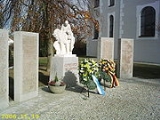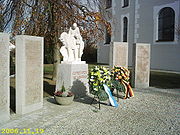
Volkstrauertag
Encyclopedia
Volkstrauertag is a day of remembrance observed annually in Germany
on the second from last Sunday before the first day of Advent
. It commemorates all those who died in armed conflicts or as the victims of violent oppression. It was first observed in its modern form in 1952.
 A Volkstrauertag was proposed in 1919 by the German War Graves Commission
A Volkstrauertag was proposed in 1919 by the German War Graves Commission
(Volksbund Deutsche Kriegsgräberfürsorge) as a commemoration for German soldiers killed in the First World War. It was first held in 1922 in the Reichstag
and in 1926, it was decided to observe Volkstrauertag regularly on Reminiscere (the second Sunday of Lent
.)
In the Weimar
years, Volkstrauertag was not a legal holiday for several reasons:
introduced national holiday legislation to create Heldengedenktag (Day of Commemoration of Heroes), cementing the observance. In the process, they completely changed the character of the holiday: the emphasis shifted to hero worship rather than remembering the dead.
Joseph Goebbels
as Propaganda Minister, issued guidelines on content and implementation, instructing that flags no longer be flown at half-mast. The last Heldengedenktag was celebrated in 1945.
, beginning in 1948. The first central meeting of the German War Graves Commission took place in 1950 in the Bundestag in Bonn. In 1952, in an effort to distinguish Volkstrauertag from Heldengedenktag, its date was changed to the end of the ecclesiastical year, a time traditionally devoted to thoughts of death, time and eternity. Its scope was also broadened to include those who died due to the violence of an oppressive government
, not just those who died in war.
. The President of Germany
traditionally gives a speech with the Chancellor, the cabinet and the diplomatic corps present. The national anthem and the song "Ich hatt' einen Kameraden" are then played. Most provinces also hold their own ceremonies; veterans usually organize ceremonies that include a procession from the respective Church service to a war memorial, prayer by the pastor, speeches by the mayor and the veterans' chairmen, a military guard of honor, several wreaths are laid, and “Ich hatt' einen Kameraden”; where available, also with the attendance of a Bundeswehr
officer as official representative.
Because of the relation to Advent, the date is the Sunday nearest 16 November, i.e. in the period from 13 November to 19 November.
Germany
Germany , officially the Federal Republic of Germany , is a federal parliamentary republic in Europe. The country consists of 16 states while the capital and largest city is Berlin. Germany covers an area of 357,021 km2 and has a largely temperate seasonal climate...
on the second from last Sunday before the first day of Advent
Advent
Advent is a season observed in many Western Christian churches, a time of expectant waiting and preparation for the celebration of the Nativity of Jesus at Christmas. It is the beginning of the Western liturgical year and commences on Advent Sunday, called Levavi...
. It commemorates all those who died in armed conflicts or as the victims of violent oppression. It was first observed in its modern form in 1952.
History

German War Graves Commission
The German War Graves Commission is responsible for the maintenance and upkeep of German war graves in Europe and North Africa...
(Volksbund Deutsche Kriegsgräberfürsorge) as a commemoration for German soldiers killed in the First World War. It was first held in 1922 in the Reichstag
Reichstag (Weimar Republic)
The Reichstag was the parliament of Weimar Republic .German constitution commentators consider only the Reichstag and now the Bundestag the German parliament. Another organ deals with legislation too: in 1867-1918 the Bundesrat, in 1919–1933 the Reichsrat and from 1949 on the Bundesrat...
and in 1926, it was decided to observe Volkstrauertag regularly on Reminiscere (the second Sunday of Lent
Lent
In the Christian tradition, Lent is the period of the liturgical year from Ash Wednesday to Easter. The traditional purpose of Lent is the preparation of the believer – through prayer, repentance, almsgiving and self-denial – for the annual commemoration during Holy Week of the Death and...
.)
In the Weimar
Weimar Republic
The Weimar Republic is the name given by historians to the parliamentary republic established in 1919 in Germany to replace the imperial form of government...
years, Volkstrauertag was not a legal holiday for several reasons:
- The Weimar constitutionWeimar constitutionThe Constitution of the German Reich , usually known as the Weimar Constitution was the constitution that governed Germany during the Weimar Republic...
did not make it clear whether the authority to define legal holidays lay with the ReichReichReich is a German word cognate with the English rich, but also used to designate an empire, realm, or nation. The qualitative connotation from the German is " sovereign state." It is the word traditionally used for a variety of sovereign entities, including Germany in many periods of its history...
or the Länder (states). Over the years this led to local differences in regulations, dates, and interpretations. - The two largest Christian churches were not in agreement over a suitable date for remembrance since each already had its own day for remembering the dead in November: the Catholic All Souls' Day and the Protestant TotensonntagTotensonntagTotensonntag , also called Ewigkeitssonntag is a German religious holiday observed mainly in Lutheran churches.- History :...
. A proposed date in spring, Invocavit (the first Sunday in Lent) or Reminiscere (the second Sunday in Lent), was in PassiontidePassiontidePassiontide is a name for the last two weeks of Lent, beginning on Passion Sunday and ending on Holy Saturday....
. This was also important for both churches, since confirmation services take place at this time in many Protestant parishes. - The political instability of the Weimar Republic obstructed some attempts to regulate the Volkstrauertag day through legislation, since the Reichstag was suspended several times in mid-term.
Heldengedenktag (1934–1945)
On 27 February 1934, the National SocialistsNazism
Nazism, the common short form name of National Socialism was the ideology and practice of the Nazi Party and of Nazi Germany...
introduced national holiday legislation to create Heldengedenktag (Day of Commemoration of Heroes), cementing the observance. In the process, they completely changed the character of the holiday: the emphasis shifted to hero worship rather than remembering the dead.
Joseph Goebbels
Joseph Goebbels
Paul Joseph Goebbels was a German politician and Reich Minister of Propaganda in Nazi Germany from 1933 to 1945. As one of Adolf Hitler's closest associates and most devout followers, he was known for his zealous oratory and anti-Semitism...
as Propaganda Minister, issued guidelines on content and implementation, instructing that flags no longer be flown at half-mast. The last Heldengedenktag was celebrated in 1945.
Modern form
After the end of World War Two, Volkstrauertag was observed in its original form in West GermanyWest Germany
West Germany is the common English, but not official, name for the Federal Republic of Germany or FRG in the period between its creation in May 1949 to German reunification on 3 October 1990....
, beginning in 1948. The first central meeting of the German War Graves Commission took place in 1950 in the Bundestag in Bonn. In 1952, in an effort to distinguish Volkstrauertag from Heldengedenktag, its date was changed to the end of the ecclesiastical year, a time traditionally devoted to thoughts of death, time and eternity. Its scope was also broadened to include those who died due to the violence of an oppressive government
Oppression
Oppression is the exercise of authority or power in a burdensome, cruel, or unjust manner. It can also be defined as an act or instance of oppressing, the state of being oppressed, and the feeling of being heavily burdened, mentally or physically, by troubles, adverse conditions, and...
, not just those who died in war.
Observation
An official observation of Volkstrauertag takes place in the German BundestagBundestag
The Bundestag is a federal legislative body in Germany. In practice Germany is governed by a bicameral legislature, of which the Bundestag serves as the lower house and the Bundesrat the upper house. The Bundestag is established by the German Basic Law of 1949, as the successor to the earlier...
. The President of Germany
President of Germany
The President of the Federal Republic of Germany is the country's head of state. His official title in German is Bundespräsident . Germany has a parliamentary system of government and so the position of President is largely ceremonial...
traditionally gives a speech with the Chancellor, the cabinet and the diplomatic corps present. The national anthem and the song "Ich hatt' einen Kameraden" are then played. Most provinces also hold their own ceremonies; veterans usually organize ceremonies that include a procession from the respective Church service to a war memorial, prayer by the pastor, speeches by the mayor and the veterans' chairmen, a military guard of honor, several wreaths are laid, and “Ich hatt' einen Kameraden”; where available, also with the attendance of a Bundeswehr
Bundeswehr
The Bundeswehr consists of the unified armed forces of Germany and their civil administration and procurement authorities...
officer as official representative.
Because of the relation to Advent, the date is the Sunday nearest 16 November, i.e. in the period from 13 November to 19 November.

